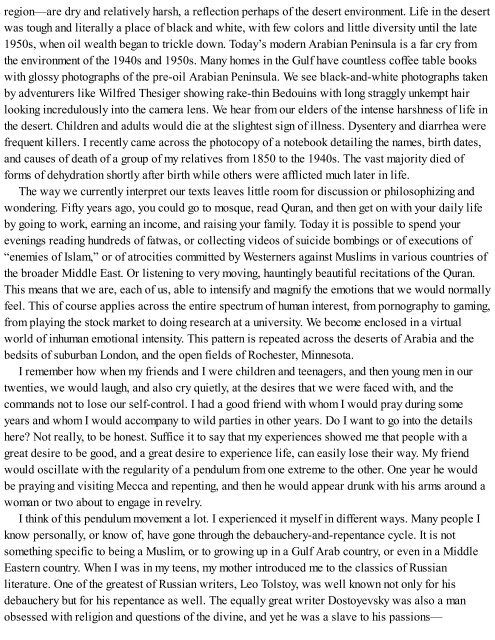1250119847
Create successful ePaper yourself
Turn your PDF publications into a flip-book with our unique Google optimized e-Paper software.
egion—are dry and relatively harsh, a reflection perhaps of the desert environment. Life in the desert<br />
was tough and literally a place of black and white, with few colors and little diversity until the late<br />
1950s, when oil wealth began to trickle down. Today’s modern Arabian Peninsula is a far cry from<br />
the environment of the 1940s and 1950s. Many homes in the Gulf have countless coffee table books<br />
with glossy photographs of the pre-oil Arabian Peninsula. We see black-and-white photographs taken<br />
by adventurers like Wilfred Thesiger showing rake-thin Bedouins with long straggly unkempt hair<br />
looking incredulously into the camera lens. We hear from our elders of the intense harshness of life in<br />
the desert. Children and adults would die at the slightest sign of illness. Dysentery and diarrhea were<br />
frequent killers. I recently came across the photocopy of a notebook detailing the names, birth dates,<br />
and causes of death of a group of my relatives from 1850 to the 1940s. The vast majority died of<br />
forms of dehydration shortly after birth while others were afflicted much later in life.<br />
The way we currently interpret our texts leaves little room for discussion or philosophizing and<br />
wondering. Fifty years ago, you could go to mosque, read Quran, and then get on with your daily life<br />
by going to work, earning an income, and raising your family. Today it is possible to spend your<br />
evenings reading hundreds of fatwas, or collecting videos of suicide bombings or of executions of<br />
“enemies of Islam,” or of atrocities committed by Westerners against Muslims in various countries of<br />
the broader Middle East. Or listening to very moving, hauntingly beautiful recitations of the Quran.<br />
This means that we are, each of us, able to intensify and magnify the emotions that we would normally<br />
feel. This of course applies across the entire spectrum of human interest, from pornography to gaming,<br />
from playing the stock market to doing research at a university. We become enclosed in a virtual<br />
world of inhuman emotional intensity. This pattern is repeated across the deserts of Arabia and the<br />
bedsits of suburban London, and the open fields of Rochester, Minnesota.<br />
I remember how when my friends and I were children and teenagers, and then young men in our<br />
twenties, we would laugh, and also cry quietly, at the desires that we were faced with, and the<br />
commands not to lose our self-control. I had a good friend with whom I would pray during some<br />
years and whom I would accompany to wild parties in other years. Do I want to go into the details<br />
here? Not really, to be honest. Suffice it to say that my experiences showed me that people with a<br />
great desire to be good, and a great desire to experience life, can easily lose their way. My friend<br />
would oscillate with the regularity of a pendulum from one extreme to the other. One year he would<br />
be praying and visiting Mecca and repenting, and then he would appear drunk with his arms around a<br />
woman or two about to engage in revelry.<br />
I think of this pendulum movement a lot. I experienced it myself in different ways. Many people I<br />
know personally, or know of, have gone through the debauchery-and-repentance cycle. It is not<br />
something specific to being a Muslim, or to growing up in a Gulf Arab country, or even in a Middle<br />
Eastern country. When I was in my teens, my mother introduced me to the classics of Russian<br />
literature. One of the greatest of Russian writers, Leo Tolstoy, was well known not only for his<br />
debauchery but for his repentance as well. The equally great writer Dostoyevsky was also a man<br />
obsessed with religion and questions of the divine, and yet he was a slave to his passions—
















